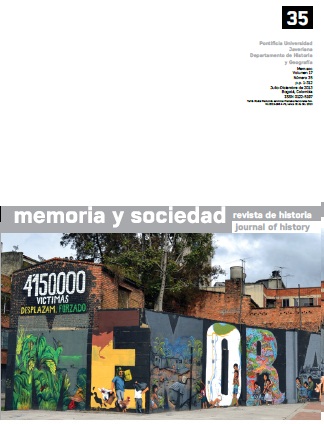Resumo
Hoy en día las políticas relacionadas con memoria histórica y patrimonio cultural están en el corazón mismo del debate público en Colombia. La Ley de Víctimas y Restitución de Tierras de 2011 –una de las prioridades del gobierno de Santos– está plasmando una nueva narrativa oficial sobre los horrores que han ensangrentado el país, a través de una serie de definiciones normativas sobre el conflicto armado, su duración, sus actores y sus víctimas. Sin embargo, muy poco se ha dicho hasta ahora con respecto a la incipiente disputa en torno al control del pasado colombiano en el espacio público de Bogotá. El artículo se enfoca en la historia del área del Cementerio Central,que ahora hospeda el Centro de Memoria, Paz y Reconciliación. La ciudad de los muertos está volviéndose el principal escenario para poner en escena una memoria nacional en la que diversas perspectivas históricas en conflicto luchan entre sí por su visibilidad.A revista Memoria y Sociedad encontra-se registada sob a licencia Creative Commons Versão 4.0 Internacional. Portanto, esta obra pode se reproduzir, distribuir e comunicar publicamente em formato digital, sempre que dado o crédito apropriado para os autores e a Pontificia Universidad Javeriana. Permite-se citar, adaptar, remixar, transformar, autoarquivar, republicar e criar a partir do material, para qualquer fim, mesmo que comercial, sempre que indicado apropriadamente o nome do criador, provido um link para a obra original e indicado se mudanças foram feitas. A Pontificia Universidad Javeriana não retém os direitos sobre as obras publicadas e os conteúdos são responsabilidade exclusiva dos autores, os quais conservam seus direitos morais, intelectuais, de privacidade e publicidade.
O aval sobre a intervenção da obra (revisão, correção, edição, tradução, formatação) e a subsequente difusão disponibiliza-se através de licença de uso e não através de transmissão de direitos, o que representa que a revista e a Pontificia Universidad Javeriana são isentas de qualquer responsabilidade que puder se derivar de uma prática ética pobre por parte dos autores. Em consequência da proteção fornecida pela licença de uso, a revista não fica na obrigação de publicar retratações ou alterar informações já publicadas, a não ser que a errata seja decorrente do processo de gestão editorial. A publicação de conteúdos nesta revista não representa royalties para os contribuintes.

